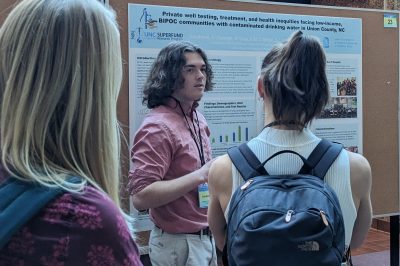UNC SRP leads discussions at Partnerships for Environmental Public Health (PEPH) Network Meeting, February 2024
UNC SRP showcased its diverse portfolio of projects that engage communities impacted by environmental contaminants at the three-day PEPH 2024 meeting. They co-hosted two workshops in collaboration with SRPs at other universities. UNC undergraduate research assistant Evan Goodman also presented a poster on his research with the UNC SRP Community Engagement Core (CEC).

Dr. Kathleen Gray
Dana Haine and Dr. Kathleen Gray co-led a workshop titled Incorporating PFAS Research into Formal (K-12) and Informal Science Learning Environments to Engage Diverse Learners. Alongside CEC leaders from NC State University (NCSU) and the University of Rhode Island SRPs, the UNC team presented a suite of different approaches for incorporating PFAS research into learning activities, which included excerpts from teacher-designed lessons created through UNC’s Iterative Design to Engage All Learners Program. The workshop generated robust discussion among attendees centered around the challenges and opportunities that arise when educating about emerging environmental contaminants.
“While teaching about environmental contamination is necessary and important, educators can’t just unload bad news on learners,” said Haine. “Fortunately, our SRP affiliation and our access to researchers, including trainees, positions us to incorporate real solutions into our educational activities, for example by showcasing people working on technologies to remove PFAS from drinking water.”
Gray also co-led a workshop on The Value and Limitations of Applying an Environmental Health Literacy Framework with Katy May of the NCSU Center for Human Health and Environment and Dr. Anna Hoover of the University of Kentucky Center for Appalachian Research in Environmental Sciences. More than 30 participants had an energized group discussion about the future of the Environmental Health Literacy framework and the desire to facilitate enhanced self-efficacy and health-protective action.
One participant underscored the importance of action at the community level, saying “we care about change,” in contrast to the knowledge gains often reported as evidence of environmental health literacy. The context was a discussion about the importance of funding to support skills development and tools for communities to use in communicating with policy makers.

UNC student Evan Goodman presents his research about private well water contamination at the Partnerships for Environmental Public Health meeting.
Evan Goodman, an undergraduate research assistant working with the UNC SRP CEC, presented the poster: Private well testing, treatment, and health inequities facing low-income, BIPOC communities with contaminated drinking water in Union County, NC. This PEPH meeting was Evan’s first professional conference. The experience, combined with his work with the CEC, inspired him to want to continue working in community engagement and to consider pursuing an advanced degree in the future.
